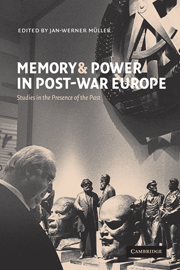Book contents
- Frontmatter
- Contents
- List of contributors
- Acknowledgements
- Introduction: the power of memory, the memory of power and the power over memory
- Part 1 Myth, memory and analogy in foreign policy
- 1 Memory of sovereignty and sovereignty over memory: Poland, Lithuania and Ukraine, 1939–1999
- 2 Myth, memory and policy in France since 1945
- 3 The power of memory and memories of power: the cultural parameters of German foreign policy-making since 1945
- 4 The past in the present: British imperial memories and the European question
- 5 Europe's post-Cold War remembrance of Russia: cui bono?
- 6 Memory, the media and NATO: information intervention in Bosnia-Hercegovina
- Part 2 Memory and power in domestic affairs
- Index
5 - Europe's post-Cold War remembrance of Russia: cui bono?
Published online by Cambridge University Press: 22 September 2009
- Frontmatter
- Contents
- List of contributors
- Acknowledgements
- Introduction: the power of memory, the memory of power and the power over memory
- Part 1 Myth, memory and analogy in foreign policy
- 1 Memory of sovereignty and sovereignty over memory: Poland, Lithuania and Ukraine, 1939–1999
- 2 Myth, memory and policy in France since 1945
- 3 The power of memory and memories of power: the cultural parameters of German foreign policy-making since 1945
- 4 The past in the present: British imperial memories and the European question
- 5 Europe's post-Cold War remembrance of Russia: cui bono?
- 6 Memory, the media and NATO: information intervention in Bosnia-Hercegovina
- Part 2 Memory and power in domestic affairs
- Index
Summary
In the course of the last ten years, a sizable chunk of territory which we used to refer to as ‘Eastern Europe’ has changed social, political, economic and alliance allegiances and reincarnated itself as ‘central Europe’. How could this happen so quickly? Inasmuch as this shift has been imbricated in changing power relations in the area, the event calls for political analysis. In partial answer to this call, the chapter points to two mnemonic factors. First, during the ‘Eastern European’ years, a discourse was kept alive by dint of which this territory was also remembered as something else, namely as ‘central Europe’. Thus, an alternative memory was already available to the local political elite, even as the Cold War era was coming to a halt. This memory was used in order to differentiate this territory from the former Soviet Union, and also from the Balkans. Second, if it was possible for this alternative memory of the territory as qualitatively different from the former Soviet Union to be accepted by ‘the West’, it was because the dominant memory of Russia in Western discourse was informed by memories of Russia as a backward country and a potential military threat. These memories emanated from periods which antedated communism, and so the fall of communism was not in and of itself enough to erase them.
- Type
- Chapter
- Information
- Memory and Power in Post-War EuropeStudies in the Presence of the Past, pp. 121 - 136Publisher: Cambridge University PressPrint publication year: 2002
- 2
- Cited by

